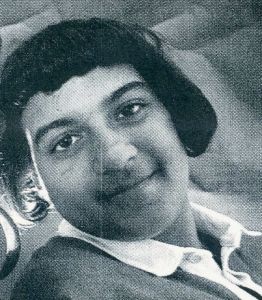It was a fitting end, my newspaper swan song. A challenging story, my Sunday article was an update of the toughest story I ever wrote — featuring two “Pregnant and Proud” teenagers in 1993, back when Roanoke had the highest teen-pregnancy rate in the state.
The public reaction had been harsh. 
Shannon Huff, seated second from left, surrounded by her children and grandchild.
The outcry went national. It was very definitely personal, with more letters to the editor pouring in to decry the story — and the reporter who wrote it — than just about any other piece in our newspaper’s history.
The emotional toll it took on me was mighty — sleepless nights, fears that I’d sunk the reputations of two minors in a way that would forever set their lives on a downward spiral. I was 29 and pregnant with my first child, in the middle of a high-risk pregnancy. I was learning to give myself insulin shots at the same time readers were publicly calling me everything from racist to naïve.
That story — badly packaged and shallowly reported, true though it was — was not my finest moment in journalism, though it not only won awards; it also taught me many of my finest journalistic lessons:
That words matter.
That you can’t predict or influence the reaction people will have to a set of facts in a story.
That you can only do your best to present those facts humanely and fairly, digging as deeply as you can.
That, when in doubt, the medical code of ethics is always a good fallback: Do no harm.
I began trying to revisit “Pregnant and Proud” in 2011. The update seemed every bit as fraught as the first, filled with reluctant family members, depressing statistics, and rap sheets full of raw truths and damning decisions.
The main subject, Shannon Huff, wasn’t sure at first she wanted another story written. By the time she was on board and the complex set of facts of her life came into focus, I wasn’t sure there was a story to tell myself — at least not one that did no harm.
But not many journalists get to revisit a story some 21 years after the fact. Fewer still get to report from the same place for the same news outlet for 25 years.
When people ask what my favorite part of being a reporter is, I try to describe the way it feels driving to an interview. Sometimes I’m nervous. Usually I’m hopeful. Always I’m running through the possibilities, prepping for the wrinkles that might emerge.
Sometimes moments of grace occur, such as when I told Shannon I’d never set out to harm her and apologized near the end of our first sit-down interview earlier this year. She stood to hug me, tears streaming down her face. She’d “been through hell in gasoline drawers,” as she put it, and her experience as a proud, pregnant teen — including the newspaper feature — had become her unlikely lodestar. She wanted badly now to prove her critics wrong.
The U.S. poet laureaute Natasha Trethewey once told an interviewer that writers have a responsibility to grapple openly and honestly with difficult subjects. “When the Birmingham church bombing convictions came down, people on the radio were saying why open these old wounds? The problem with that thinking is assuming those wounds had healed. Some bones broken will forever be weak. … The best we can hope for is acknowledgment.”
Acknowledgment. That word was on the spelling test I took as an applicant for a feature writing job at The Roanoke Times in 1989. So was the word accommodate (some things you just never forget!).
The best journalists worry less about accommodating official viewpoints and more about acknowledging the little people caught in the web of tough circumstances, whether they’re showing up for court or for medical treatment, or standing in line at the VEC.
As the great reporter Susan Spencer-Wendel, who died last week of ALS at age 47, put it: “It was a privilege to go to work each day and grow democracy, to ferret out stories no one wanted told, to be trusted to inform and, yes, entertain our readers. When someone would ask me: ‘Who sent you?’ I loved to reply, ‘Well, ma’am, that would be Thomas Jefferson.’ ”
Nothing but the truth: It’s worth remembering the journalistic oath we made when we signed on for all the bad hours, low pay and sleepless nights, infused with the privilege of witnessing heartache and joy and, yes, judgment.
On the eve of the publication of my first book, “Factory Man,” I recently quit newspapering in favor of the deeper dive of researching and writing books. I’ll seek out my usual underdog subjects, working through the issues I now know I was born to tackle.
I’ll mine for the facts, which will do what they always do: morph into falsehoods the more I learn and the deeper I go.
Shannon Huff, 16 years old in 1993, from the original newspaper article. Public radio reporter Beverly Amsler interviewed me about this story for a featured that aired here.






